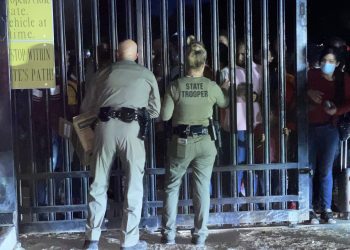DES MOINES, Iowa – An Iowa Senate subcommittee on Wednesday, consisting of State Senators Amy Sinclair, R-Allerton, Ken Rozenboom, R-Oskaloosa, and Claire Celsi, D-West Des Moines, advanced SSB 3080, Gov. Kim Reynolds’ education reform and school choice bill, by a two to one vote.
The bill requires school districts to publish online course syllabuses, how classes meet or exceed state standards, the titles of all textbooks, reading material, and videos used in class, or provide links to websites containing those materials. The bill also requires school districts to publish their policies and procedures online related to how those materials are reviewed and approved. The bill also requires school districts to provide a list of all of the books in their schools’ libraries and a flow chart for how a parent can request a book’s removal.
SSB 3080 also requires school districts to adopt policies and procedures for selecting, reconsidering and removing materials in their school libraries. The bill also requires a school district to review library material within ten business days of a parent or guardian requesting the reconsideration or removal of that material.
The bill also includes “Student First Scholarships,” which are Education Savings Accounts that would be implemented during the 2022-2023 school year. Scholarships would be worth 70 percent of the state’s per-pupil spending, currently $5,359, for qualified education expenses. A student must be enrolled in a public school for the 2021-22 school year and have a household income that does not exceed 400 percent of the federal poverty level or have an individualized educational plan to be eligible. The scholarships in the first year will be capped at 10,000.
The remaining 30 percent will be reallocated to smaller school districts with 500 or fewer students.
The legislation also requires schools to assess their students’ knowledge of government and civics by administering an assessment based on the most recent version of the assessment developed by the U.S. Citizenship and Immigration Services. Students will be required to answer 70 percent of the questions correctly as a condition of graduation.
The bill also allows parents with a child who requires special education to homeschool those students under competent private instruction without approval from the director of special education in the Area Education Agency of the child’s district of residence.
The bill also removes the requirement for licensed school librarians to have a master’s degree.
Most of the public comments focused on the ESA aspect of the bill.
“We support all choice in education. We believe in funding students and not systems,” Jake Highfill, a former state representative and lobbyist with EdChoice, told the subcommittee.
“These scholarships would give parents the ability to choose a learning environment where their kids can better thrive rather than confine them to a place where they’re falling behind,” Chuck Hurley with The FAMiLY Leader said in support of the bill.
Emily Piper with the Iowa Association of School Boards expressed concerns with the transparency section of the bill due to workability issues but said school districts already provide much of the information required in the bill.
She opposed the Student First Scholarships. “We believe public taxpayer dollars should be for public schools,” Piper said.
She also expressed concerns about the civics assessment requirement and codifying social studies standards.
“I would hate to see kids that are very talented, who don’t do well on standardized tests being told they could not graduate even though they’ve met all the other requirements,” Piper argued.
Marisa Mathson, a junior at Des Moines Christian School in Urbandale, spoke in support of the bill.
“Kids are individuals with unique learning needs that specialized schools can accommodate. Some students may benefit from single sex schools or smaller environments, and allowing parents that opportunity and choice to spend some of their tax dollars towards private education would open valuable learning opportunities for those students. I personally know several people that would like a Christian education but cannot afford to pay tuition,” she said.
Charlotte James, a junior at Dowling Catholic High School in West Des Moines, also spoke in favor of the bill.
“When I speak to my friends outside of school, they often wish for the opportunities that I’ve been blessed with. Not all families in Iowa are able to make the choice of where their students will attend school. By offering scholarships to students, there’s more of an opportunity for those who want to push themselves and succeed. We will also be able to make our private schools more diverse and unify our community by making school choice an option for more families,” she said.
Some expressed concern that the bill does not go far enough.
“I would like to see it expanded a little bit to include current homeschoolers,” Michelle Skibo, a parent of a special needs parent in Pella, said.
Melissa Peterson with the Iowa State Education Association spoke against the bill said the state already allows parents many educational options.
“We have quality private schools, as well as some competent independent instruction or homeschool opportunities within this state. We actually have lots and lots of choice. We actually also, as a state, currently subsidize private education to the tune of over $60 million because we want to make sure that whether a student is going to a public school or a private school, that they do have access to services,” she said.
Margaret Buckton with the Urban Education Network of Iowa also opposed the bill. She expressed concerns with the workability of the transparency piece of the bill and then addressed Education Savings Accounts.
“We have pretty good education here in Iowa, and we’re striving to get better all the time. But what we don’t have is unlimited resources. So when we’re in a situation of deciding the priorities of the state, and we can’t even come up to an inflation rate on an increase on the per-student amount for our public schools to open the door to something, that if it expands, could be upwards to half a billion dollars if we’ve costed out things like adding homeschool, and providing that that education savings account for everybody in private school,” she said.
Nicole Hasso, a congressional candidate in Iowa’s 3rd Congressional District, discussed growing up on the south side of Chicago.
“My family was poor. My mom struggled with drug addiction, and my dad was not around. My brother chose to go in the corner and sell drugs, and I chose to go to the library and study. In high school, I was ranked number three out of 384 kids. If my parents had the opportunity to send me to a private school and not have to worry about paying for it, how much more could I have been able to accomplish? So now, I focus on making sure that my children have every opportunity that I was not afforded,” she said.
Dave Daughton, representing Rural School Advocates of Iowa, spoke in opposition to the bill.
“We as rural schools certainly recognize and appreciate a parent’s choice to send their child to another school district, a different type of school, homeschool, whatever it happens to be. However, we don’t believe that public funds should follow, should go to private sources. We think that over 90 percent of the kids are educated in the public schools, and we’re fearful, I guess I would use that word, that this will become an incentive for parents to pull their kids out of schools and use the money for the education of their kids in another way. So we just are not in favor of public funds going to private schools,” he said, noting that rural schools do appreciate the additional support provided in the bill.
Drew Klein with Americans for Prosperity supported the bill.
“I think the problem is we’re missing the reality in education. And that is that students are individuals. They’re not part of some collective. They’re not part of a number on a spreadsheet that some educrats here in Des Moines are going to dictate what’s best for a collective. They’re individuals, and every single one of them is capable of greatness, so long as we have the opportunity to meet the unique needs, aptitudes, and values of those students. But our funding system today doesn’t really allow for that,” he said.
“I don’t see this as an ‘us versus them’ type of argument. Again, anybody who wants to continue to choose Public education is going to have that available to them. There is not a public school system in the country that has closed because of a school choice program. Those options will be on the table. But for everybody else, for the ones that are trapped by their zip code and their family’s income. We deserve to have more opportunity for those. We owe those families more opportunity,” Klein added.
Sinclair, chairing the meeting, due to time limited comments to just those in the room, and encouraged those watching the meeting online to submit their comments by email.
The lawmakers on the subcommittee ended the meeting with their concerns.
Celsi opposed the bill. “It’s not our job to create a whole new (education) system and then fund that. It’s just going to get bigger and bigger.”
“There’s no transparency whatsoever there,” she added, claiming that Florida’s voucher program had $1 billion in fraud, and states with school choice programs also struggle with fraud and abuse.
“This is a bad bill from A to Z,” Celsi added.
Rozenboom supported the bill.
“Iowans value school choice, as demonstrated by nearly 40,000 private school students and countless many, many more homeschool advocates or families. And a lot of Iowans believe our school choice options are very, very limited as opposed to what someone said today. I would argue that our choices are far too limited. Parents and families who desire school choice cut across all social and economic lines; this isn’t a rich versus poor question,” he said.
Sinclair gave passionate closing remarks pointing to a recent discussion about school choice where most of those at the table had sent their children to private school, homeschooled, or enrolled their student in a private college.
“Every single person at that table had access to school choice. Every single person at that table had access to school choice. Do you know what’s different about the people at that table and the people addressed by this bill? You want to know what the difference is? We have the means to choose. We had the means to choose. We were capable of paying that tuition or capable of teaching our children at home. We have the means to choose. Do you know who is not open to school choice, who’s not allowed to choose their education? It’s parents who don’t have the means to choose, and this bill addresses those parents,” she said, slapping her hand on the table.
The bill can move forward for consideration by the whole Iowa Senate Education Committee.















